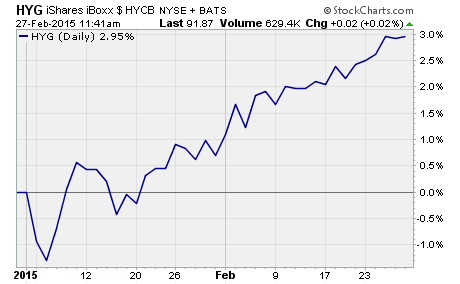What Do The February ETF Fund Flows Tell Us?
 Today is the last day to trade ETFs in February. As the month comes to an end, we’re taking a look back at the February ETF fund flows and other sentiment indicators for clues to the market’s next move.
Today is the last day to trade ETFs in February. As the month comes to an end, we’re taking a look back at the February ETF fund flows and other sentiment indicators for clues to the market’s next move.
ETF fund flows are a valuable indicator of what traders are thinking. It takes a lot of buying or selling to drive millions or even billions of dollars into or out of individual ETFs.
Fund flows are something traders use to find trends and gauge investor sentiment. And it can help you pinpoint which ETFs could be next to make a big move higher or lower.
ETFs reached $2 trillion in assets under management in December. But they didn’t add much to those totals in January.
The emotion driving February ETF Fund Flows…
We monitor several fundamental and technical indicators of fear and greed.
There were two things that jumped out at me in the February data. Demand for junk bonds surged higher and call option volume outpaced put option volume by a wide margin.
This was a major reversal from what we saw in January from both of these indicators. Greed is now the dominant emotion on Wall Street.
This is the second year in a row that has started out full of fear and bearish sentiment in January. But by mid-February, it was clear that greed and bullish sentiment were back in control of the market.
The ETFs with the largest inflows in February…
Not surprisingly, the ETF with the largest net inflow of money was tied to high yield debt. As I pointed out earlier, we saw a bullish reversal in investor demand for high yield debt or junk bonds.
iShares iBoxx $ High Yield Corporate Bond ETF (HYG) gained a whopping $2.3 billion in assets during the month of February. HYG tracks an index of liquid high yield corporate bonds for sale in the United Sates.

Investors are clearly diving back into riskier investments in hopes of reaping bigger rewards.
The WisdomTree Europe Hedged Equity ETF (HEDJ) is another ETF that enjoyed a strong month of inflows. For the second month in a row, it had net inflows greater than $2.2 billion.
You might recall, HEDJ is designed to provide exposure to European equities while neutralizing fluctuations between the Euro and the US Dollar.
HEDJ seeks to eliminate currency changes so that US investors can invest in European stocks without the need to worry about the currency market volatility.
Overall, investors seem to be favoring international equity and high yield fixed income to US equities.
The ETFs with the largest outflows in February…
ETF outflows were modest overall during the month of February as total assets in US listed ETFs surged above $2.07 trillion.
The two ETFs that lost the most assets in February were the iShares US Technology (IYW) and iShares Russell 2000 (IYM). IYW lost $1.5 billion while IWM shed $1.2 billion in assets.
The outflows are a bit surprising given their recent performance. IYW is up 4.7% year-to-date and IWM is up 3.0% year-to-date. Both of them are outperforming the S&P 500 that is up 2.8% this year.
The way I see it, this looks like profit taking and reallocation into other sector ETFs given the overall ETF fund flows in February.
Right now, greed and bullish sentiment are the dominant emotions driving the markets. Investors are positioning themselves to profit from the markets next surge to the upside.
Good Investing,
Corey Williams
Note: Corey Williams writes and edits ETFTradingResearch.com. Sign up for our free ETF reports and free e-letter at http://etftradingresearch.com/free-sign-up. We’re devoted to helping you make more money from ETFs.
Category: Market Analysis




